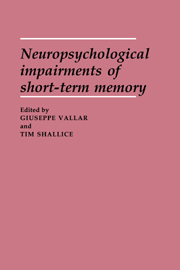Book contents
- Frontmatter
- Contents
- List of contributors
- Acknowledgments
- General introduction
- I THE FUNCTIONAL ARCHITECTURE OF AUDITORY–VERBAL (PHONOLOGICAL) SHORT-TERM MEMORY AND ITS NEURAL CORRELATES
- II PHONOLOGICAL SHORT-TERM MEMORY AND OTHER LEVELS OF INFORMATION PROCESSING: STUDIES IN BRAIN-DAMAGED PATIENTS WITH DEFECTIVE PHONOLOGICAL MEMORY
- III SHORT-TERM MEMORY STUDIES IN DIFFERENT POPULATIONS (CHILDREN, ELDERLY, AMNESICS) AND OF DIFFERENT SHORT-TERM MEMORY SYSTEMS
- IV PHONOLOGICAL SHORT-TERM MEMORY AND SENTENCE COMPREHENSION
- Name index
- Subject index
IV - PHONOLOGICAL SHORT-TERM MEMORY AND SENTENCE COMPREHENSION
Published online by Cambridge University Press: 11 May 2010
- Frontmatter
- Contents
- List of contributors
- Acknowledgments
- General introduction
- I THE FUNCTIONAL ARCHITECTURE OF AUDITORY–VERBAL (PHONOLOGICAL) SHORT-TERM MEMORY AND ITS NEURAL CORRELATES
- II PHONOLOGICAL SHORT-TERM MEMORY AND OTHER LEVELS OF INFORMATION PROCESSING: STUDIES IN BRAIN-DAMAGED PATIENTS WITH DEFECTIVE PHONOLOGICAL MEMORY
- III SHORT-TERM MEMORY STUDIES IN DIFFERENT POPULATIONS (CHILDREN, ELDERLY, AMNESICS) AND OF DIFFERENT SHORT-TERM MEMORY SYSTEMS
- IV PHONOLOGICAL SHORT-TERM MEMORY AND SENTENCE COMPREHENSION
- Name index
- Subject index
Summary
The final part of this book includes five chapters dealing with the very contentious issue of the putative role of phonological memory in sentence comprehension. A first and general difficulty for the neuropsychological analysis of this question, which is independent of the specific problem at issue, is that claims for a positive role are based on an association and not on a dissociation of deficits (see Shallice, 1988, for discussion). This makes it difficult to determine the precise nature of the putative causal role of immediate memory deficits in the genesis of the comprehension impairment in patients with a specific span defect. Consider, for instance, the observations that short-term memory patients, even though their comprehension is comparatively preserved at the clinical level, typically show some impairment in tasks such as the Token Test and that a classical dissociation (i.e., patients with a defective auditory–verbal span and an entirely preserved sentence comprehension) had not been reported so far (see reviews in Caplan & Waters, chapter 14, and Vallar, Basso, & Bottini, chapter 17). This pattern prima facie suggests a role of phonological memory in speech comprehension. However, an association of neuropsychological symptoms produced by brain damage might arise from the anatomical contiguity of the neural structures involved in immediate retention of verbal material and in speech comprehension. After all, the neurological correlate of auditory–verbal short-term memory deficits is a lesion of a left inferoposterior parietal region, which is a part of the language areas. The hypothesis that short-term phonological memory has a specific role in speech comprehension would need to be corroborated by sets of experiments from which it is possible to rule out a simple interpretation in terms of anatomical proximity.
- Type
- Chapter
- Information
- Neuropsychological Impairments of Short-Term Memory , pp. 331 - 336Publisher: Cambridge University PressPrint publication year: 1990



